The Government of Canada believes in free and fair collective bargaining. The use of replacement workers can distract from negotiations, it can prolong disputes, and it can damage labour relations for years to come.
Today, Terry Sheehan, MP for Sault Ste. Marie and Parliamentary Secretary to the Minister of Labour and Seniors, joined Minister Seamus O’Regan Jr. a he introduced legislation which proposes to ban the use of replacement workers in federally regulated workplaces during a strike or lockout. The legislation would also make important changes to improve the maintenance of activities process.
“I thank Minister O’Regan and our government for bringing this legislation forward. This will help workers in Sault Ste. Marie and right across Canada, because workers deserve to know that they won’t be replaced while exercising their right to strike and collectively bargain. As Parliamentary Secretary to the Minister of Labour, I’m looking forward on working to usher this through Parliament.” said, Terry Sheehan. Member of Parliament for Sault Ste. Marie and Parliamentary Secretary for to the Minister of Labour and Seniors.
“We’re banning the use of replacement workers because we believe in collective bargaining. Our economy depends on employers and workers negotiating an agreement at the table. That’s where we get stability for our economy, that’s where strong labour relations are forged, and that’s where the best deals are made.” said, Seamus O’Regan Jr., Minister of Labour and Seniors.
Bill C-58 would ban employers from using replacement workers to do the work of unionized employees who are on strike or locked out. An exception would apply in situations where there are threats to health and safety, or threats of serious property and environmental damage that could not be managed by the employer’s existing workforce. If a union believes the employer is using replacement workers in capacities beyond this exception, their recourse would be to file a complaint with the Canada Industrial Relations Board (CIRB), who would then investigate the issue.
The Government also recognizes that the current maintenance of activities process can be lengthy, further prolonging or complicating disputes.
To strengthen the maintenance of activities process, Bill C-58 would require employers and unions to come to an agreement early in the bargaining process to determine what work needs to continue during a strike or lockout, if any. The parties would have 15 days to do this. If they cannot come to an agreement, the CIRB would decide what activities need to be maintained within 90 days. The Minister would continue to have the authority to refer questions to the CIRB to protect the health and safety of Canadians.






